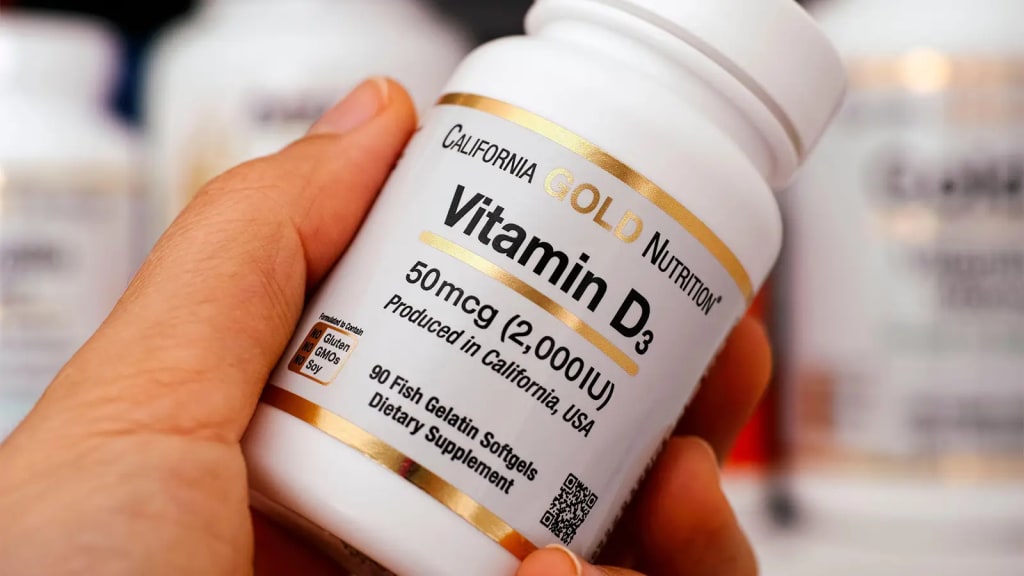Can High-Dosage of Vitamin D Prevent Diabetes!?
Combining the results of three separate trials showed a significant reduction in risk – something that wasn't seen when looking at each trial individually! It's a great reminder that the whole can be greater than the sum of its parts.

Good news for those at risk of diabetes! According to a recent study by Anastassios Pittas and his team at Tufts Medical Center, daily higher-dose vitamin D supplementation may help reduce the risk of type 2 diabetes by 15%. The meta-analysis of three randomized clinical trials adjusted for age, gender, BMI, race, and HbA1c showed that vitamin D had a significant effect on the risk of developing diabetes in those with prediabetes. So if you're at risk, consider adding a daily dose of vitamin D to your routine!
A recent study published in the Annals of Internal Medicine suggests that daily higher-dose vitamin D supplementation may help reduce the risk of diabetes in at-risk populations. The meta-analysis of three trials found that participants taking 20,000 IU (500 mcg) per week of cholecalciferol, 4,000 IU (100 mcg) daily of cholecalciferol, or 0.75 mcg daily of eldecalcitol all had a 3.3% (95% CI 0.6-6.0%) absolute risk reduction over the course of 3 years. Additionally, the reduced risk of full-blown diabetes persisted even when those who stopped taking the trial pills, started using a diabetes or weight loss medication, or took supplemental vitamin D at a dose above 1,000 IU/d outside the trial were excluded (HR 0.83, 95% CI 0.73-0.94).
However, the editorial authors of the study noted that on their own, all three of these trials found similarly nonsignificant diabetes risk reductions associated with vitamin D supplementation. Despite this, the study’s results still suggest that daily higher-dose vitamin D supplementation may help stop the risk of Diabetes.
Pittas and their team argued that the original trials on their own weren't powerful enough to detect the potential benefits of vitamin D on diabetes progression. Even though the relative risk reduction of diabetes with vitamin D is only 15%, the absolute risk reduction over 3 years was 3.3%, meaning that 30 people with prediabetes would need to take vitamin D supplements to see the same effect as 7 people who underwent intensive lifestyle modifications or 14 people who took metformin in the Diabetes Prevention Program study. That's a lot of people! If we extrapolate this to the 374 million adults with prediabetes worldwide, it's estimated that vitamin D supplementation could delay the development of diabetes in over 10 million people. That's a huge potential benefit and it's really inexpensive too!
McKenna and Flynn have cautioned that taking very high doses of vitamin D supplements, beyond the recommended 10 to 20 mcg (400 to 800 IU) daily, may cause harm. Fortunately, the meta-analysis did not reveal any safety signals, such as an increased risk for kidney stones, hypercalcemia, or hypercalciuria.
Professional societies have a duty of care to understand advice from government agencies when it comes to vitamin D therapy and its benefits and harms. To promote population health, they should encourage recommendations about vitamin D intake requirements, 25-(OH)D thresholds, and safe limits. A recent study combined three trials and included 4,190 individuals, of which 2,097 received vitamin D and 2,093 received placebo. The results showed that those who maintained higher serum 25-hydroxyvitamin D levels had a 76% reduced risk for progression to diabetes. This translated to a 3-year absolute risk reduction of 18.1%.
The editorialists had some reservations, though. They noted that the "optimal effect" of vitamin D supplementation was seen when the 25(OH)D levels were above 125 nmol/L – which is equivalent to a daily intake of 100 mcg (4,000 IU). This is the highest level of daily vitamin D intake recommended by organizations like the NIH to avoid any potential side effects.
I hope this article was insightful and remember to always speak with your primary doctor before thinking about adding more Vitamin D into your daily routine. Until the next article stay beautiful!
Love,
Aelita Marianna Sandoval 🖤
About the Creator
Aelita Sandoval
Transgender Female Blogger! Marketing and Business Administration are my strong points. I’m a very creative person and enjoy helping others succeed and have them feeling they’re greatest!






Comments
There are no comments for this story
Be the first to respond and start the conversation.